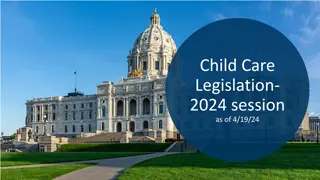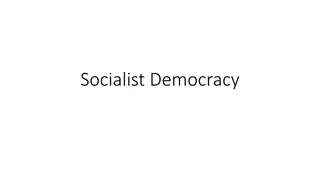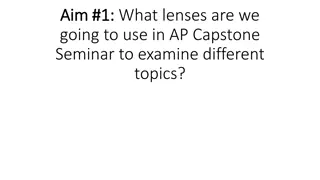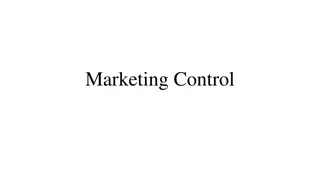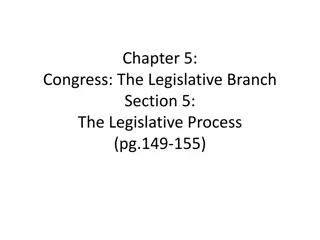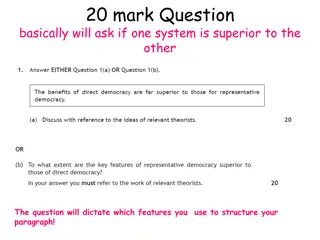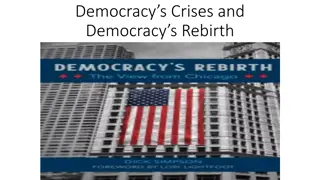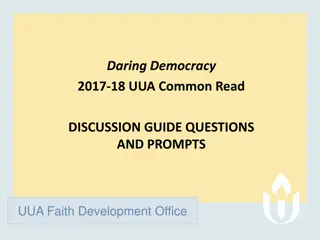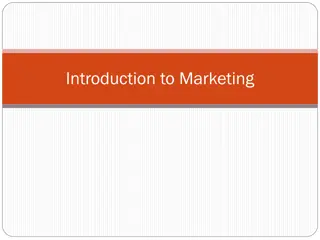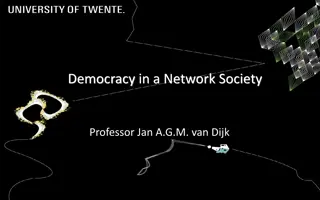The Impact of Omnibus Bills on Democracy and Marketing Strategies
Omnibus bills, such as HR-1 and Build Back Better, are complex and opaque, contributing to increased polarization and voter alienation. While corporations follow clear marketing rules, Congress's use of omnibus bills may harm democracy by creating confusion and lack of transparency. The failure to pass bills like HR-1 highlights these challenges and the need for clearer communication in politics.
Uploaded on Aug 20, 2024 | 0 Views
Download Presentation

Please find below an Image/Link to download the presentation.
The content on the website is provided AS IS for your information and personal use only. It may not be sold, licensed, or shared on other websites without obtaining consent from the author. Download presentation by click this link. If you encounter any issues during the download, it is possible that the publisher has removed the file from their server.
E N D
Presentation Transcript
Omnibus Bills Increase Polarization, Alienate Voters, and Hurt Democracy!
Marketing 101 Marketing 101 The Harvard Business School rules of marketing are pretty simple. Keep it simple stupid (KISS) Know your product Know your customer Provide clear targeted messages for each product. 2
How Corporations Market How Corporations Market Procter & Gamble does not say, Buy P&G products. It runs separate ads for among others: Bounty- The Quicker Picker Upper, Mr. Clean- gets rid of grease and grime in just a minute, Tide- get your clothes Tide clean Gillette- for the best shave a man can get, Pfizer does not run ads saying, We make drugs, Buy lots today. It runs separate ads for among others Eliquis (for Afib), Lipitor (cholesterol), COVID, and Viagra. The 12-17-year-old looking for a COVID shot is probably not a Viagra customer. Consumers like to know exactly what they are buying and why. 3
Congressional Marketing Congressional Marketing- -0000 0000 Yet when Congress markets to voters, it ignores the rules. Instead of creating bills customers can understand, it creates opaque Omnibus bills. The current Congress has introduced a series of Omnibusbills, like HR-1 For the People, Build Back Better and others. The names seem nice, but these bills are so complex that few understand their content or cost. Voters are given a dream, not specific policies that will help them. Negotiations are not between Democrats and Republicans, but rather between Progressive and Moderate wings of the Democratic party. These bills could pass, although HR-1, For the People Act, has thus far failed. But no matter the outcome, these bills will hurt our democracy. Voters will continue to lose faith in government, partisanship will become more extreme, and both parties will be hurt. 4
Omnibus Omnibus- -HR HR- -1 1- - For The People Act For The People Act- - Sits in Limbo Sits in Limbo On March 3, HR-1, the 800-page Omnibus For the People Voting Rights Act passed the house with all Democrats voting for it, and all but one Republican voting against it. The bill went to the Senate, where Democrats knew they faced a filibuster. It has sat dormant for 8 months. Even the N.Y. Times said, The For the People Act was a flawed bill that had little chance of testing the limits of what, if anything, is still possible in Washington." Meanwhile, Republicans in state after state have passed targeted legislation that runs counter to the goals of HR-1 and makes voting more difficult. HR-1 included many elements a majority of voters of both parties supported, such as getting foreign money out of elections and improving registration. Yet while Republican bills in state after state have become law, the For the People Act sits in limbo. 5
Build Back Better-POLL The current Omnibus bill before Congress is Build Back Better, a $3.5 trillion, 1065-page bill. Between the time that we wrote this presentation and today, this bill has changed many times. It could be $3.5 trillion, $2.0 trillion, or even smaller. However, for the purposes of today s discussion, we are going to focus on the original bill. Before looking at the content of this bill, we are going to have a short poll. We are going to list a number of programs and ask each of you to select which of these is in the original bill. 6
Parks, Energy, Education, Employment, Native American? Parks, Energy, Education, Employment, Native American? 1. 2. 3. 4. 5. 6. 7. 8. 9. 10. Investments in Historically Black Colleges and Universities 11. Reentry opportunities for ex-offenders 12. Registered Apprenticeships 13. Job Corps 14. Native American Programs 15. Migrant & Seasonal Farmworker Programs 16. Youth Build Programs Select which of these is in Build Back Better. Wildlife Service funding for trails National Forest Restoration & Fuels Reduction Rural Energy Savings Biofuels Infrastructure Clean Energy Repowering Rural Utilities Urban Agriculture Free Community College Tuition Assistance for Students at Historically Black Colleges Pell Grants and Student Loans 7
Seniors, Childcare, Pre-K, Pregnancy. Electric, Clean Air? 17. Senior Community Service Employment Program 18. Child Care 19. Universal Pre-K 20. Child Nutrition and Related Programs 21. Family Violence Prevention 22. Pregnancy Assistance Fund 23. Funding for the aging network & infrastructure 24. Rebuilding the electric grid 25. Clean heavy-duty vehicles 26. Reduce Air Pollution at Ports 27. Greenhouse Gas Reduction 28. Diesel emissions reductions 30. Lead Service Line Replacement for Drinking Water 31. Clean Electricity 32. Building efficiency & resilience 33. Zero emissions vehicle infrastructure Select which of these is in Build Back Better 8
Health Insurance, Supply Chain & Housing? Health Insurance, Supply Chain & Housing? 34. Health Insurance Affordability for low-income populations 35. Long-term care for older populations 36. Closing the Medicaid coverage gap 37. Children s Health Insurance Program 38. Medicare Coverage of Dental, Hearing, and Vision Services 39. Giving Medicare & Medicaid the right to negotiate drug prices 40. Children s tax credit 41. Paid Family Leave 42. Funding to support public health infrastructure 43. Supply Chain Resilience 44. Affordable Housing for the 21st Century 45. 21st Century Sustainable and Equitable Communities 46. Lead paint & hazard mitigation 47. Homeownership Investments Select which of these is in Build Back Better 9
Immigration, Small Business, Climate? Immigration, Small Business, Climate? 48. Law full permanent r sidence for certain entrants. 49. Modification of Visa Provisions 50. Increasing Federal Contracting Opportunities for Small Businesses 51. Empowering Small Business Creation and Expansion in Underrepresented Communities 52. Offshore Wind for the territories 53. Climate Conservation Corps 54. Urban Parks 55. Every Kid Outdoors 56. Park Service Climate Resilience 57. Drought Response and Preparedness 58. Water reclamation 59. Water technology & reuse investment 60. Passenger rail improvement & modernization 61. Great Lakes Icebreaker 62. Sewer overflow & stormwater reuse grants Select which of these is in Build Back Better 10
Taxation Taxation 64. Raising income tax rate to 39.6% for people making over $400K. 65. 3% surcharge for incomes above $5 million 66. IRA limits of $10 million 67. Extend American Rescue Plan for Child Tax Credits 68. Make earned income tax credit and child tax credits permanent 69. Increase top capital gains rate to 25% 70. Extend the carried interest holding period from 3 years to 5 years 71. Reduce the estate tax exemption to $6 million 72. Limit pass through deductions 73. Make permanent the active pass-through loss limitation 74. Increase the top corporate tax rate to 26.5% 75. Reduce the deduction for Global Intangible Low-Tax income 77. Limit interest deductions for multinationals 78. Delay the requirement to amortize R&D Select which of these is in Build Back Better 11
More Taxation More Taxation 79. Accelerate limitation on business deductions for highly paid individuals 80. Extend & modify tax credits for green energy, housing, rehabilitation & others 81. Reinstate superfund tax on petroleum and by-products 82. Expand tax credits for low-income households 83. Tax credits for childcare workers and caregivers 84. Tax changes targeted at Crypto Currencies, including wash sales 85. Change valuation rules for transfers of non-business assets Select which of these is in Build Back Better. Vote by Number for the policies that are in Build Back Better. 12
OOPS OOPS We Didn t Pay Zoom We Didn t Pay Zoom We were planning to give you a few minutes to review the 85 choices for our poll, but I have just been informed by Herb Kaplan, our master poll taker, that our Zoom contract only allows us 10 choices. Unfortunately, we are going to have to cancel our poll. We apologize! Since we cannot have a poll, we are going to give you the correct answers. If you voted for #1,#2, and #3, you are correct. If you voted for #4, #5, and #6 you are also correct. In fact, if you voted for all the 85 choices, you get 100%. There are actually many more than 85 items in the bill, but we got tired typing. This bill is so complex and the negotiations for what is or is not included have been so opaque, that whatever occurs, the impact on American Democracy will be negative. Let s look at the issues with Omnibus bills like Build Back Better. 13
Problems With Omnibus Bills Problems With Omnibus Bills Most Americans do not understand what is in the bill, further alienating them from government. If no bill passes, Democrats will have wasted their opportunity. If a bill passes, one group of Democrats (moderates or progressives) will be disappointed. In either case, voters will have been left in the dark with no way to indicate their preferences. Republicans will have opposed many policies they support, because they are focused on opposing Democrats, not on governing. Partisanship will continue to increase. When Democrats run in 2022 or 2024, they will have a difficult time articulating what they have done for the American public. Republicans will also have a difficult time, because they will have done nothing positive, although Stop the Steal, Build a Wall, and Make America Great Again may work for them. Government will become even more deadlocked. 14
Voters Dont Understand Build Back Better Voters Don t Understand Build Back Better The first, and largest problem with Omnibus bills, like Build Back Better, is that few understand what is in the bills. According to a recent CBS/YouGov poll, only 10% of Americans thought they knew a lot of the specifics, compared to 28% who knew none of the specifics and 29% who had no clue to what was in the bill. We suspect that even 10% could be overstating knowledge. $3.5 trillion is a lot to spend on a bill very few know much about. 15
Voters Dont Think Build Back Better Will Help Them Voters Don t Think Build Back Better Will Help Them If people don t know what is in a bill, they will have no clue as to how the bill will benefit them. In the CBS/You.Gov poll, Only 36%. think the expenditure of $3.5 trillion would help them or the economy. 33% said it would hurt, and 31% said it would have no impact. People react to specific benefits not to big think concepts. A 60% increase in gas prices is real. Creating a climate conservation corps is a concept. 16
Critical Bipartisan Elements Can Get Buried Critical Bipartisan Elements Can Get Buried Another problem with Omnibus bills is that critical elements, with bipartisan support can get buried. This week, we asked two of the country s leading constitutional scholars, Ned Foley of Ohio State and Rick Pildes of NYU, about the greatest threat to Democracy. They responded that loopholes in the election acts of 1845 and 1887 as well as in the 12th and 20th amendments could lead to disputed elections and a constitutional crisis. They noted that neither Democrats nor Republicans want a constitutional crisis or a disputed election, and that there was bipartisan support for fixing these loopholes. We then asked, what was happening with the legislation and were informed the fixes were buried in the Omnibus H.R.4 - John R. Lewis Voting Rights Advancement Act of 2021. Because this bill is complex and partisan, Congress is unlikely to pass it. Thus, we are risking a disputed elections and a constitutional crisis because simple but critical legislation is buried in Omnibus bills. We will have a presentation on this legislation in the next several months. 17
Omnibus Bills Hurt Democrats Omnibus Bills Hurt Democrats Democrats are risking everything with Omnibus Bills. The first Omnibus bill, HR-1 for the People Act has already failed, leaving Democrats with no accomplishments in voting rights, while Republicans have passed specific legislation in many states. If Build Back Better fails, Democrats will be left with no signature accomplishments, except for the infrastructure bill, which could take a while before it impacts individual Americans. The negotiations between moderate and progressive Democrats have lowered support for the party and the President. If Build Back Better is passed, Democrats will not get much credit, because few understand what is in the bill and by the time they realize the positive elements, Democrats could have lost their slim majorities. Depending on what is ultimately included in Build Back Better, either progressive Democrats will have disappointed voters or moderate Democrats could lose their seats. 18
Approval Rates for Democrats & Biden are Plunging Approval Rates for Democrats & Biden are Plunging We believe there is a correlation between Omnibus bills and Democrats popularity. Since Democrats embarked on the Omnibus strategy, polls have shown strong negative reactions. Biden s popularity ratings have plunged. A recent Suffolk poll has Biden s approval at 38% and disapproval at 59%. Kamala Harris is much less popular Harris s popularity rating was 28% Congress is even more pitiful. Its approval rating is 12% and its disapproval rating is 75%. 64% of the people think the country is moving in the wrong direction and only 27% think it is moving in the right direction. The intent of the Omnibus bills does not seem to be registering with voters. 19
Omnibus Bills Hurt Republicans Omnibus Bills Hurt Republicans While Republicans will benefit from Biden s lack of popularity and the view that the country is moving in the wrong direction, they may not be better off because they have sat on the sidelines. Republicans have been good at articulating negative positions like Stop the Steal, Build a Wall, and Make America Great Again. However, if Build Back Better fails, Democrats can blame Republicans for opposing lowering drug prices, leaving the elderly without long-term care, stopping actions to improve the electric grid or modernizing schools, and refusing to debate on some of the most important legislation in decades. If Build Back Better passes and is successful, Democrats will get credit for all the new programs. How will the Republicans justify their complete inaction? 20
Great Legislation Is Usually Bipartisan Great Legislation Is Usually Bipartisan Most important legislation in U.S. history like Social Security, The Interstate Highway System, the Civil Rights Act, Medicare, The Food Stamp Program, Social Security Reform, Tax Reform Act of 1986, Americans with Disabilities Act, Welfare Reform 1996. was passed with strong bipartisan majorities. In recent years, the major legislation passed by only one party was The Affordable Care Act (Obamacare), and when the other party gained control, its focus was to undo the legislation (repeal & replace.) 21
Stalemating Government Stalemating Government When Omnibus bills have the support of only one party, Cooperation between the parties ceases to exist. Instead of working together to legislate in the interests of all Americans, the two parties become islands fighting each other. With bills too complex for voters to understand the public becomes increasingly alienated from its elected officials. The two parties continue to war over issues few understand. 22
Congress Throws a Hail Mary Congress Throws a Hail Mary If Omnibus bills confuse voters, increase partisanship, stalemate government, and often fail, why do politicians continue to introduce them? The answer is: Partisan Politics Look at any Omnibus bill and you will see buried inside it issues that have little relation to the bill and that have no chance of passing unless they are hidden in a bill too complex for people to understand. This is the politicians way of saying Right now, we have power. If the next election works against us, we will lose our chance. Let s pack in everything we can and go for the big win. In sports parlance, we would call this strategy a Hail Mary. 23
HR HR- -1 Sleight of Hand 1 Sleight of Hand HR-1 has many sections that would improve our elections, but Democrats snuck in sections that would be deal breakers. Granting statehood to the District of Columbia and giving Territories the right to vote. These may be good actions, but they are partisan as D.C. and the territories are strongly Democratic. Votes for statehood have always been passed separately. Presidential Tax Transparency Making Presidential candidates release 10 years of tax returns.---Do you hear the name Donald Trump? Presidential Conflicts of Interest Making government officials divulge financial conflicts of interest. Do you hear the name Donald Trump? Executive Branch Ethics Enforcement Act of 2019. Designed to get at all the ethics violations Democrats claimed were in the Trump Administration. Federal funding of Campaigns Sounds good, but has anyone studied its impact? Congressional redistricting reform. Changing the way states draw election boundaries without debate. Redistricting is a mess but hiding it in an Omnibus bill is not the way to solve it. 24
Build Back Better Sleight of Hand Build Back Better Sleight of Hand Build Back Better has policies that have little to do with Building (i.e.. granting citizenship to large numbers of people living in the U.S.) or would seem to have relatively limited support among voters (I.e.. providing offshore wind for U.S. territories.) Wildlife Service funding for trails. Urban Agriculture Tuition Assistance for Students at Historically Black Colleges Migrant & Seasonal Farmworker Programs. Family Violence Prevention Pregnancy Assistance Fund Law full permanent r sidence for certain entrants. Modification of Visa Provisions Every Kid Outdoors Park Service Climate Resilience Great Lakes Icebreaker 21st Century Sustainable and Equitable Communities Offshore Wind for the territories. The authors of this bill inserted these and other jewels that they knew could never pass Congress. 25
Voting on Specific Policies Is a Better Alternative Instead of having one large Omnibus bill, like HR-1 or Build Back Better, Congress could consider splitting these bills into many parts and allowing voters and politicians to have their say on each of the items. Voters could signal their preferences. Leaders of both parties could work together. Congress might finally be able to accomplish something. 26
Many Parts of Build Back Better Enjoy Strong Bipartisan Support. Many Parts of Build Back Better Enjoy Strong Bipartisan Support. 27
Some Are Supported by Majorities of all Political Groups Some Are Supported by Majorities of all Political Groups Total D IN R Long term care for seniors and allowing Medicare to negotiate drug prices are strongly supported by large majorities of all political groups. Republicans support Long Term Care for seniors with 75% pro and only 17% con. Republicans support letting Medicare negotiate drug prices with 63% pro and only 24% con. Long Term Care for Seniors Pro Con Net 79 12 67 87 6 81 74 15 59 75 17 58 Medicare Negotiate Drug Pricea Pro Con Net 73 15 58 81 8 73 74 14 60 63 24 39 Source Data for Progress 9/13/21 Would Mitch McConnell really want to run on a platform telling voters that he opposed Long Term Care for their parents? Would Marco Rubio want to tell Seniors in Florida that he voted for them to pay higher drug prices? If these two policies were placed in single bills, they would likely pass with strong support from both parties. 28
More Policies with Bipartisan Support More Policies with Bipartisan Support Modernizing the electric grid and school buildings also enjoy strong bipartisan support. 65% of Republicans support modernizing the electric grid with only 25% opposed. 66% support modernizing school buildings with only 25% opposed. Modernizing Electric Grid Pro Con Net 74 16 58 83 5 78 70 18 52 65 25 40 Would Louisiana s two Republican Senators vote against modernizing the electric grid after Hurricane Ida knocked out much of the state s electricity for more than one month? Modernizing School Buildinga Pro Con Net 73 18 55 82 10 72 72 19 53 66 25 41 Source Data for Progress 9/13/21 Would Senators from rural states really vote to deprive students from being able to attend schools that are not falling apart and that have internet? 29
Even Taxation Has Bipartisan Support Even Taxation Has Bipartisan Support What one might expect to be the most partisan of issues, taxation, also has relatively broad bipartisan support. 64% of people support making the wealthiest pay more, a net positive rating of 37%. Republicans support this 51-40. Total D IN R Making the Wealthiest 2% Pay More Pro 64 27 37 78 13 65 61 31 30 51 40 11 Con Net 66% of people support increasing the capital gains tax, a net positive rating of 40%. Republicans support this by a substantial 54-38. Total D IN R Increase Capital Gains Tax Pro 66 80 60 54 Con 26 11 32 38 Given the level of bipartisan support, it is likely that a few Republican Senators and House Members would support a few of these tax proposals. We use these examples because we were able to identify polling support by party on each of these items. There are many other policies included in Build Back Better that would also have bipartisan support. Net 40 69 28 16 Source Data for Progress 9/13/21 30
One Policy At A Time One Policy At A Time- -A Different Plan A Different Plan Why can t government introduce bills aimed at solving one problem at a time? Suppose that instead of Build Back Better, Democrats introduced separate bills for Providing Long Term Care, Allowing Medicare to Negotiate Drug Costs, Modernizing the Electric Grid, Modernizing School Buildings, Raising taxes on the wealthiest, and Increasing the capital gains tax rate. Each of these policies are easy for voters to understand. Each would pass with support from both parties. Once passed, each would be very popular with voters. Voters would then feel the country was moving in the right direction. Members of Congress would feel they could work across the aisle to solve problems. With a number of major well-defined bills passed, and voters feeling more optimistic, the party in control (in this instance, Democrats) could introduce more legislation that could be supported by both parties. 31
Other Policies that Could Receive Bipartisan Support Other Policies that Could Receive Bipartisan Support Other policies that could receive bipartisan support might include: Rural Energy Savings Universal Pre-K Funding for the aging network & infrastructure Medicare Coverage of Dental, Hearing, and Vision Services Funding to support public health infrastructure Supply Chain Resilience Drought Response and Preparedness Water reclamation Passenger rail improvement & modernization Limit interest deductions for multinationals Tax credits for childcare workers and caregivers Tax changes targeted at Crypto Currencies, including wash sales A substantial number of laws could be passed with bipartisan support and approval from the majority of voters. 32
Conclusion Conclusion Instead of Omnibus bills that voters do not understand which are supported by one party or the other, we recommend that Congress go back to the basic rules of marketing. Keep It Simple Stupid: Don t make laws too complex to understand. Know your product: Provide laws that voters can understand. Know your customer: Listen to the voters who elected you. Provide Clear Messages: Explain to voters why each law is important and what it will cost. Target Messages to Clearly Define Customers: Explain to voters how the laws will impact their lives. If Congress focuses on marketing to voters instead of developing bills too complex for anyone to understand, it may find that the two parties can work together to solve the problems impacting our country. 33




